Startups developing thermotherapy devices for Cutaneous Leishmaniasis, low-cost solutions to democratize access to space, AI medical image analysis, a brain monitoring solution, and a nurse staffing platform each win CHF 10,000
23.08.2023
DermatoTherma, DPhi Space, Pathy, optohive, and WeNurse win Venture Kick's first stage of financial and entrepreneurial support. Their projects make medical-grade thermotherapy devices for health organizations in developing nations worldwide; provide a plug-and-play solution for customers willing to fly their instruments to space; aim to simplify medical image analysis in histopathology; pioneer an innovative and scalable brain monitoring solution for assessing the brain in neurological disorders; and empowers nurses to self-organize on their self-owned staffing platform.
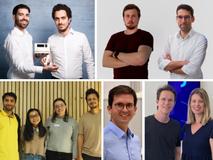 |
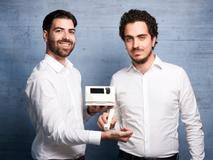 DermatoTherma: From left to right CEO Davide Paparo, and CTO Ian Häusler
|
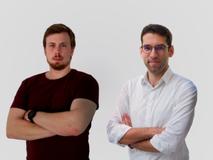 DPhi Space: CTO Michael Linder & CEO Aziz Belkhiria
|
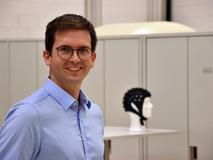 optohive: CEO Dominik Wyser
|
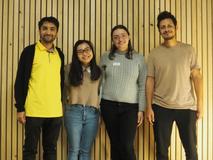 Pathy: CTO Saeed Saadatnejad, COO Nhi Luong, CSO Rina Mehmeti, and CEO Aous Khadhraoui
|
 WeNurse: Co-Founders Simon Hodel and Alessia Schrepfer
|
DermatoTherma: Medical-grade thermotherapy devices for Cutaneous Leishmaniasis
DermatoTherma aims to solve a failing treatment system for the neglected skin disease Cutaneous Leishmaniasis. A flesh-eating parasite causes the disease, resulting in skin lesions that leave disfiguring, life-long scars that bring severe social stigma, particularly for women and children. Available treatment requires patients to undergo 21 days of painful injections with drugs developed over 70 years ago and commonly compared to chemotherapy.
The startup was founded by CEO Davide Paparo and CTO Ian Häusler at the ZHAW School of Engineering. They developed a new thermotherapy device that enables a 1-time treatment using electromagnetic waves to deliver local heat applications. The heat burns away the parasite, and once the entire lesion has been treated, the natural regeneration system of the human body can take over. The disease is endemic in over 90 nations worldwide, with 12 million currently affected and yearly incidences of 1 million. Middle and South America and North Africa have a serviceable available market of 19.5 million USD and a serviceable obtainable market of 7 million USD.
The Venture Kick grant will be used to establish further stakeholder connections and build two devices to be used in clinical trials.
DPhi Space: Extending Earth
DPhi's main focus is to solve the challenge of high costs and complexities associated with deploying payloads into space. The advent of off-the-shelf small satellites represented a pivotal leap in democratizing access to space. The startup leverages the proliferation of this technology to create an even more cost-effective solution with enhanced capabilities. This enables smaller entities to deploy their assets into space within record times and at a lower cost. DPhi's long-term vision is to project Earth's technological achievements into space, transforming the orbit into a direct extension of our planet.
The startup is a spinoff from the Swiss Institute EPFL with Founders including CEO Aziz Belkhiria and CTO Michael Linder. During their tenure at the EPFL Spacecraft Team, they managed to launch and operate a computer from space, marking the return of EPFL to orbit for more than a decade. Together with a team of engineers; Joaquim Silveira and Saverio Nasturzio, they are developing the ridesharing platform built on the heritage of their first mission. This platform is designed to provide a plug-and-play solution for customers willing to fly their instruments to space. Moreover, it strives to introduce technologies previously deemed unsuitable for space applications, thereby contributing to the foundational phase of Earth's extension: launch and operations.
The Venture Kick funds will help the team in the preparation of the maiden flight that will accommodate the first riders to low earth orbit.
Pathy: Simplify medical image analysis with Artificial Intelligence
Pathologists are facing an intensive workload due to the high demand for pathology services, increasing case complexity, and a worldwide shortage of pathologists. As a result, 47% of pathologists experience burnout from manual and repetitive workloads. This leads to slower turnaround times for diagnoses and compromised care due to fatigue-induced errors that affect patients.
Pathy aims to simplify medical image analysis in histopathology. Their Software-as-a-Service platform provides AI-powered histopathology solutions that automate repetitive analyses, enable objective quantitative analyses in challenging cases, and assist pathologists in both diagnosis and research. Pathy targets a USD 20.9 billion market with a 37% CAGR fueled by digitalization trends in healthcare. The well-rounded founding team includes CEO Aous Khadhraoui, CTO Saeed Saadatnejad, CSO Rina Mehmeti, and COO Nhi Luong with expertise in computer science, pathology research, and medtech commercialization.
The Venture Kick funds will enable the team to speed up the development process and secure pilot studies with early adopters in Pathology Research.
optohive: Brain imaging for monitoring stroke recovery
Globally, 1 in 4 persons will experience a stroke in their lifetime, making it a leading cause of disability. Although the treatment of stroke aims to restore impaired brain functions, there exists no regular clinical assessment to directly assess its recovery. As such, the impaired brain is mainly treated as a black box in current neurorehabilitation, often hindering optimal therapy.
Optohive pioneers an innovative and scalable brain monitoring solution for assessing the brain in neurological disorders. Our solution enables individualized patient treatment with a direct focus on the brain and restoration of specific brain networks, facilitating more efficient therapies. We incorporate a tailored optical brain imaging system based on near-infrared imaging and combine it with advanced algorithms and AI-powered analysis to achieve exceptional performance in terms of recording local brain activity, including high single-subject reproducibility as a crucial feature for clinical applications. In the US and Europe alone, there are close to 1M patients per year requiring inpatient rehabilitation, generating direct and indirect costs of USD 105B, all of whom could profit from brain-targeted assessments to support their rehabilitation. Optohive is an ETH Spin-Off project led by Dr. Dominik Wyser. The team includes Muriz Serifovic, Michael Wyser, Dr. Juan Mata Pavia, Dr. Olivier Lambercy, Prof. Roger Gassert, and Prof. Martin Wolf.
The Venture Kick funds from the first stage will be used to develop a showcase for the stroke neurorehabilitation assessment, initiate pilot projects, and further establish stakeholder relationships.
WeNurse: Staffing agency owned by the working nurses
Due to the shortage of qualified nursing staff, not all departments of hospitals or nursing homes can be operated at the moment. The danger of medical underuse is increasing. WeNurse has set itself the goal of keeping nursing professionals in the profession or bringing back dropouts with a new form of work.
WeNurse is a temporary staffing agency to hire nurses for the Swiss healthcare sector co-founded by Simon Hodel and Alessia Schrepfer. WeNurse empowers nurses to self-organize on its self-owned staffing platform. They want to accelerate a paradigm shift towards a more democratized body leasing industry in a high-quality healthcare system. The uniqueness of WeNurse is the fact that the employees are also majority shareholders of the company and define its strategy. WeNurse is a modern cooperative and employee movement and an answer to poorly paid wages for nurses.
They plan to use the Venture Kick Stage 1 Fund to further develop the recruitment of skilled nursing professionals in order to accelerate future growth.
DermatoTherma aims to solve a failing treatment system for the neglected skin disease Cutaneous Leishmaniasis. A flesh-eating parasite causes the disease, resulting in skin lesions that leave disfiguring, life-long scars that bring severe social stigma, particularly for women and children. Available treatment requires patients to undergo 21 days of painful injections with drugs developed over 70 years ago and commonly compared to chemotherapy.
The startup was founded by CEO Davide Paparo and CTO Ian Häusler at the ZHAW School of Engineering. They developed a new thermotherapy device that enables a 1-time treatment using electromagnetic waves to deliver local heat applications. The heat burns away the parasite, and once the entire lesion has been treated, the natural regeneration system of the human body can take over. The disease is endemic in over 90 nations worldwide, with 12 million currently affected and yearly incidences of 1 million. Middle and South America and North Africa have a serviceable available market of 19.5 million USD and a serviceable obtainable market of 7 million USD.
The Venture Kick grant will be used to establish further stakeholder connections and build two devices to be used in clinical trials.
DPhi Space: Extending Earth
DPhi's main focus is to solve the challenge of high costs and complexities associated with deploying payloads into space. The advent of off-the-shelf small satellites represented a pivotal leap in democratizing access to space. The startup leverages the proliferation of this technology to create an even more cost-effective solution with enhanced capabilities. This enables smaller entities to deploy their assets into space within record times and at a lower cost. DPhi's long-term vision is to project Earth's technological achievements into space, transforming the orbit into a direct extension of our planet.
The startup is a spinoff from the Swiss Institute EPFL with Founders including CEO Aziz Belkhiria and CTO Michael Linder. During their tenure at the EPFL Spacecraft Team, they managed to launch and operate a computer from space, marking the return of EPFL to orbit for more than a decade. Together with a team of engineers; Joaquim Silveira and Saverio Nasturzio, they are developing the ridesharing platform built on the heritage of their first mission. This platform is designed to provide a plug-and-play solution for customers willing to fly their instruments to space. Moreover, it strives to introduce technologies previously deemed unsuitable for space applications, thereby contributing to the foundational phase of Earth's extension: launch and operations.
The Venture Kick funds will help the team in the preparation of the maiden flight that will accommodate the first riders to low earth orbit.
Pathy: Simplify medical image analysis with Artificial Intelligence
Pathologists are facing an intensive workload due to the high demand for pathology services, increasing case complexity, and a worldwide shortage of pathologists. As a result, 47% of pathologists experience burnout from manual and repetitive workloads. This leads to slower turnaround times for diagnoses and compromised care due to fatigue-induced errors that affect patients.
Pathy aims to simplify medical image analysis in histopathology. Their Software-as-a-Service platform provides AI-powered histopathology solutions that automate repetitive analyses, enable objective quantitative analyses in challenging cases, and assist pathologists in both diagnosis and research. Pathy targets a USD 20.9 billion market with a 37% CAGR fueled by digitalization trends in healthcare. The well-rounded founding team includes CEO Aous Khadhraoui, CTO Saeed Saadatnejad, CSO Rina Mehmeti, and COO Nhi Luong with expertise in computer science, pathology research, and medtech commercialization.
The Venture Kick funds will enable the team to speed up the development process and secure pilot studies with early adopters in Pathology Research.
optohive: Brain imaging for monitoring stroke recovery
Globally, 1 in 4 persons will experience a stroke in their lifetime, making it a leading cause of disability. Although the treatment of stroke aims to restore impaired brain functions, there exists no regular clinical assessment to directly assess its recovery. As such, the impaired brain is mainly treated as a black box in current neurorehabilitation, often hindering optimal therapy.
Optohive pioneers an innovative and scalable brain monitoring solution for assessing the brain in neurological disorders. Our solution enables individualized patient treatment with a direct focus on the brain and restoration of specific brain networks, facilitating more efficient therapies. We incorporate a tailored optical brain imaging system based on near-infrared imaging and combine it with advanced algorithms and AI-powered analysis to achieve exceptional performance in terms of recording local brain activity, including high single-subject reproducibility as a crucial feature for clinical applications. In the US and Europe alone, there are close to 1M patients per year requiring inpatient rehabilitation, generating direct and indirect costs of USD 105B, all of whom could profit from brain-targeted assessments to support their rehabilitation. Optohive is an ETH Spin-Off project led by Dr. Dominik Wyser. The team includes Muriz Serifovic, Michael Wyser, Dr. Juan Mata Pavia, Dr. Olivier Lambercy, Prof. Roger Gassert, and Prof. Martin Wolf.
The Venture Kick funds from the first stage will be used to develop a showcase for the stroke neurorehabilitation assessment, initiate pilot projects, and further establish stakeholder relationships.
WeNurse: Staffing agency owned by the working nurses
Due to the shortage of qualified nursing staff, not all departments of hospitals or nursing homes can be operated at the moment. The danger of medical underuse is increasing. WeNurse has set itself the goal of keeping nursing professionals in the profession or bringing back dropouts with a new form of work.
WeNurse is a temporary staffing agency to hire nurses for the Swiss healthcare sector co-founded by Simon Hodel and Alessia Schrepfer. WeNurse empowers nurses to self-organize on its self-owned staffing platform. They want to accelerate a paradigm shift towards a more democratized body leasing industry in a high-quality healthcare system. The uniqueness of WeNurse is the fact that the employees are also majority shareholders of the company and define its strategy. WeNurse is a modern cooperative and employee movement and an answer to poorly paid wages for nurses.
They plan to use the Venture Kick Stage 1 Fund to further develop the recruitment of skilled nursing professionals in order to accelerate future growth.


